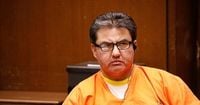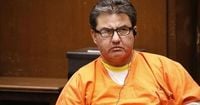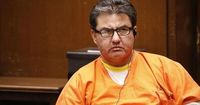In a sweeping federal indictment unsealed this week in New York, Naasón Joaquín García—the longtime leader of the Mexican megachurch La Luz del Mundo—faces fresh charges of racketeering conspiracy, sex trafficking, and child exploitation, capping a yearslong investigation that has rocked the multi-million-member religious organization and sent shockwaves through faith communities across the globe.
García, 56, is already serving more than 16 years in a California prison after pleading guilty in 2022 to sexually abusing young followers, a conviction that drew international attention and inspired both Netflix and HBO documentaries. But the new federal case, announced by the U.S. Attorney for the Southern District of New York on September 10, 2025, alleges a far more extensive criminal enterprise—one that prosecutors say spanned decades, continents, and generations of church leadership.
According to The Associated Press, the indictment charges García and five others—including his 79-year-old mother, Eva García De Joaquín—with exploiting La Luz del Mundo to enable the systemic sexual abuse of children and women. The church, founded in Mexico nearly a century ago and claiming five million followers in more than 50 countries, is accused of serving as a cover for a "parallel structure" of abuse that began under García’s grandfather and intensified under his father, Samuel Joaquín Flores, who died in 2014.
The indictment details harrowing allegations: victims as young as 13 were groomed and coerced into sexual acts, often with the promise of salvation or the threat of damnation. Prosecutors say García used his spiritual authority as the self-proclaimed "Apostle of Jesus Christ" to manipulate girls, boys, and women into believing that serving him would bring divine blessing. In some cases, children were required to wear masks to obscure the incestuous nature of the abuse. The criminal activity allegedly included the creation of photos and videos of child sexual abuse, forced labor, and illegal financial transactions.
Federal authorities say the abuse was not limited to Mexico. Church locations across the United States—including in California, New York, Nevada, Texas, Georgia, Indiana, North Carolina, South Carolina, New Jersey, and Washington, D.C.—as well as sites in Europe, Asia, and Africa, were implicated. According to the indictment, sex trafficking and exploitation occurred as a result of the church’s international reach, with victims pressured to travel for forced and unlawful sex acts.
In a statement, U.S. Attorney Jay Clayton declared, "García and the others exploited the faith of their followers to prey upon them. When they were confronted, they leveraged their religious influence and financial power to intimidate and coerce victims into remaining silent about the abuse they had suffered." Ricky J. Patel, head of the New York office of Homeland Security Investigations, described the case as the result of a "yearslong investigation that spanned the country and involved the support of dozens of courageous victims."
The indictment also paints a picture of a church leadership intent on silencing dissent and covering its tracks. Prosecutors allege that after García’s arrest, two defendants and others attempted to destroy evidence and prevent victims from speaking to law enforcement. Victims were pressured to sign false declarations denying abuse, and church doctrine was reinforced to equate doubting the apostle with a sin punishable by eternal damnation. Sermons were drafted and distributed, branding all sexual abuse victims as liars.
The financial aspect of the alleged crimes is equally striking. Followers were required to forward a portion of their income to the church, which prosecutors say funded the García family’s extravagant lifestyle—luxury cars, designer clothing, expensive watches, and first-class travel worldwide. As Latin Times reported, the U.S. Department of Justice described the operation as an "illicit enterprise" that weaponized faith and trust to maintain silence and compliance among its members.
Law enforcement’s response has been sweeping. On September 10, federal agents executed search warrants at multiple Los Angeles properties tied to La Luz del Mundo, seeking evidence that could further link the leadership to the alleged crimes. Eva García De Joaquín was arrested in Los Angeles, while Joram Nunez Joaquín, 37, was taken into custody outside Chicago. Three additional suspects—Rosa Sosa, 59; Azalia Rangel Garcia, 46; and Silem Garcia Pena, 43—are believed to be in Mexico, with extradition proceedings underway.
The scale and longevity of the alleged abuse is chilling. Prosecutors say the pattern dates back to the church’s founding, with each generation of leadership exploiting the mothers of future victims. "Many of the grandfather's victims were mothers of girls and women abused by García's father, and many of the father's victims were the mothers of girls and women abused by García," the indictment notes. The indictment lists 13 female victims anonymously, describing attacks that occurred while they were under the age of consent.
Retired LAPD detective Moses Castillo, now a private investigator, told FOX Los Angeles that the federal investigation uncovered crimes not just in California but "throughout the country and also in other parts of the world." Castillo, who has met several survivors, said, "When I hear those graphic details firsthand, it just breaks my heart, because he used his title, his position of the apostle. He used that to prey on the most innocent of children." He added, "I would be shocked that he would take this to trial, because if he does, then it's going to expose all the dark secrets of the church, and I don't think he wants to do that."
García’s defense, however, remains steadfast. In a statement, his attorney Alan Jackson called the indictment the result of "a reckless campaign of government overreach" and insisted, "We categorically deny these charges." Jackson described the allegations as "a rehashing of old, recycled claims that have been made before, scrutinized before, and ultimately debunked and disproven before," promising that the defense would expose them as "desperate, unfounded, recycled and driven by ulterior motives."
La Luz del Mundo itself has not issued a public statement addressing the latest charges. In previous cases, church leadership and many followers have stood by García, insisting on his innocence and attributing the accusations to religious persecution. Yet, the indictment’s scope and the breadth of international law enforcement involvement suggest a reckoning is at hand not only for García but for the entire structure that enabled his alleged crimes.
If convicted on all federal counts, García—already behind bars—could spend the rest of his life in prison. The case stands as a stark reminder of the dangers of unchecked authority and the power of faith, for better or worse, to shape the lives of millions.



